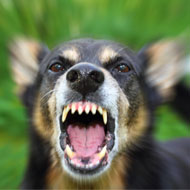Battersea calls for further action on dangerous dogs

Battersea are calling for a genuine government dog strategy to review and improve the way dogs are regulated.
Battersea Dogs & Cats Home has welcomed tough new legislation to prevent dog attacks, however the animal charity is calling for more government action to help prevent dogs becoming dangerously out of control.
A leading voice on responsible dog ownership, Battersea say that they fully support the new legal powers, and will enable police and local authorities to demand that owners take action to prevent dog attacks if a complaint about their dog has been made and upheld.
However, Battersea are concerned that the new laws do not do enough to protect communities or tackle wider issues, such as the backstreet breeding and unregulated online sales of puppies - many of which are brought and trained up to be used as weapon dogs.
Battersea's head of canine welfare training, Ali Taylor, said: "The new powers will certainly help the police and local authorities in their efforts to tackle the problem of anti-social behaviour with dogs and the use of dogs as a substitute for a gun or a knife. Such dogs can cause untold harm to humans and other animals.
"But Battersea thinks protecting the public from dangerous dogs and their irresponsible owners is so important that the Government shouldn’t lump this issue in alongside other anti-social behaviours such as graffiti, noise and bullying. We’re calling for a genuine government dog strategy to review and improve the way dogs are regulated.”
Many animal welfare organisations, including Battersea, have called for the introduction of Dog Control Notices, which are currently used in Scotland. The notices are easy for both owners and enforcers to understand and act as genuine preventative measures, while not penalising responsible dog owners.
Battersea say that educating dog owners on their responsibility is also key to preventing dog attacks happening in the first place.
Ali Taylor continued: “We hope these new powers for the police and local authorities help reduce the amount of dog attacks we see on our streets but there is still a real need for more early prevention to stop attacks happening in the first place. We want the law to succeed and reduce anti-social behaviour without penalising responsible dog owners. Battersea will be playing our part to help it do so.”



 The Animal and Plant Health Agency (APHA) has updated its online reporting service for dead wild birds.
The Animal and Plant Health Agency (APHA) has updated its online reporting service for dead wild birds.